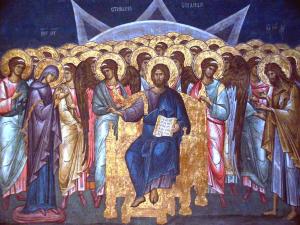
God reaches out towards us, indeed engages us so that we can become partakers of the divine nature; all things which pertain to godliness, the graces which we need, are granted to us so that we can become like god:
His divine power has granted to us all things that pertain to life and godliness, through the knowledge of him who called us to his own glory and excellence, by which he has granted to us his precious and very great promises, that through these you may escape from the corruption that is in the world because of passion, and become partakers of the divine nature (2 Ptr. 1:3-4 RSV).
Theosis, deification, being made gods by grace (and not by nature), is understandable when we realize that this means we become united with the divine energies, reflecting them in and through ourselves. Through them, we take on those qualities which we attribute to God, those names which we predicate to God thanks to the divine energies. What God is in essence is beyond all those names, even though it is signified by and so predicated with the name of god. This is because all such names indicate something which is less than the divine substance itself:
As a result, with reference to the mode of signification there is in every name that we use an imperfection, which does not befit God, even though the thing signified in some eminent way does befit God. This is clear in the name goodness and good. For goodness has signification as something not subsisting, while good has signification as something concreted. And so with reference to the mode of signification no name is fittingly applied to God; this is done only with reference to that which the name has been imposed to signify. Such names, therefore, as Dionysius teaches, can be both affirmed and denied of God. They can be affirmed because of the meaning of the name; they can be denied because of the mode of signification. [1]
To become godlike, to be deified, is therefore to synergize ourselves with the divine energies, energies which are in and themselves God’s grace. The divine energies point to and reveal God to those who cooperate and unite with them. Likewise, as they are grace, they purify, illuminate, and perfect us; it is by being perfected, in and through them, that we become what is indicated by the divine names. Thus St. Gregory Palamas explained: “This resplendence and deifying energy of God, that deifies those who participate in it, constitutes divine grace, but it is not the nature of God.” [2] “Grace is communicated to all worthy of it, in a way proper and peculiar to each one, while the divine essence transcends all that is participle.” [3] It is this grace, this energy of God, which makes us good, wise, and spiritually beautiful. Indeed, it is what renders us and our bodies immortal. For, as St. Athanasius indicated, immortality itself is a quality which we attribute to God; in and through being made like God, we partake of that divine energy which allows us to call God “the immortal one” and become immortal ourselves: “For He was made man that we might be made God ; and He manifested Himself by a body that we might receive the idea of the unseen Father; and He endured the insolence of men that we might inherit immortality.”[4]
The distinction between the uncreated energy of God and the essence of God therefore preserves the absolute transcendence of the divine nature, while also showing how and why we can be said to become gods through grace. We are to be gods, not because our substance and the substance of God will merge in some sort of monistic unity, but because we partake of what comes from the nature of God, the divine energy:
God’s essence is entirely unnamable since it is also completely incomprehensible. Therefore we name it on the basis of all its energies, although with respect to the essence itself none of those names means anything different from any other. For by each name and by all names together nothing other is named except that which is hidden and whose real identity is unknown to all. But with respect to the energies, each of these names has a different significance, for we all know that the acts of creating, ruling, judging, providential guidance, and of God’s adopting us as sons through His grace, are acts that differ from one another. [5]
We, then, are called to union with God, and this is possible because of the divine energies. With God being simple and not composite, those energies must not be seen as absolutely distinct from the divine nature. Instead, they come from and flow from it. And so, St, Gregory of Nyssa, reflecting upon the substance and energies of God, said:
Still I do not think that he would affirm that we should consider the being of God to be something heterogeneous and composite, having the energy inalienably contained in the idea of itself, like an ‘accident’ in some subject-matter: he must mean that the beings, deliberately and voluntarily moved, produce by themselves the desired result. But, if this be so, who would style this free result of intention as one of its external consequences? We have never heard of such an expression used in common parlance in such cases; the energy of the worker of anything is not said to ‘follow’ that worker. We cannot separate one from the other and leave one behind by itself: but, when one mentions the energy, one comprehends in the idea that which is moved with the energy, and when one mentions the worker one implies at once the unmentioned energy. [6]
Because they are not absolutely divided from the divine essence, the divine energies are truly of God and can be said to be God, and all those who partake of them partake of God and the divine nature through them. But, because they are distinguished from the divine substance, when we partake of them, we partake of the divine nature in the way which it condescends to meet us in its engagement with us, in a form which we not only can apprehend, but unite with it as well: “The deifying gift of the Spirit thus cannot be equated with the superessential essence of God. It is the deifying energy of this divine essence, yet not the totality of this energy, even though it is individual in itself.” [7] It is not the totality of the energy because the totality of the energy is the divine essence itself, as divine simplicity affirms God’s essence is God’s activity. And so the divine substance comes to us in a variety of forms, producing a variety of names which we can use to describe the God who is beyond all names:
The theologians affirm that the uncreated energy of God is indivisibly divided and multiple, as St Basil the Great has explained above. And since the divine and deifying illumination and grace is not the essence but the energy of God, for this reason it comes forth from God not only in the singular but in multiplicity as well. It is bestowed proportionately on those who participate in it, and corresponding to the capacity of those who receive it the deifying resplendence enters them to a greater or lesser degree. [8]
The divine names, the energies of God, make us godlike and so make us gods as we join with them and become one with them. The all-deifying God, who is beyond all the names that we attribute to it, raises us up to partake of those qualities and virtues which we properly attribute to it, all the while remaining beyond us and our comprehension, as Palamas proclaimed:
Because the Deity is goodness itself, true mercy and an abyss of loving beauty – or, rather, He is that which embraces and contains this abyss, since He transcends every name that is named (cf. Eph. 1:21) and everything we can conceive – we can receive mercy only by union with Him. We unite ourselves to Him, in so far as this is possible, by participating in the godlike virtues and by entering into communion with him through prayer and praise. Because the virtues are similitudes of God, to participate in them puts us in a fit state to receive the Deity, yet it does not actually unite us to Him. But prayer through its sacral and hieratic power actualizes our ascent to and union with the Deity, for it is a bond between noetic creatures and their Creator. [9]
St. Thomas Aquinas, similarly, said:
So, too, the perfections of all things, which belong to the rest of things through diverse forms, must be attributed to God through one and the same power in Him. This power is nothing other than His essence, since, as we have proved, there can be no accident in God. Thus, therefore, God is called wise not only in so far as He produces wisdom, but also because, in so far as we are wise, we imitate to some extent the power by which He makes us wise. [10]
This, then, means the promises of Christ will be fulfilled. He told us that we would do the works which he did, the works of the Father: “Truly, truly, I say to you, he who believes in me will also do the works that I do; and greater works than these will he do, because I go to the Father” (Jn. 14:12 RSV). We do the works he does because we join in with those works, in the energies of God. “Now there are varieties of gifts, but the same Spirit; and there are varieties of service, but the same Lord; and there are varieties of working, but it is the same God who inspires them all in every one” (1 Cor. 12:4-6 RSV). There are a variety of divine energies, so that in and through them, we can see a variety of gifts of the Spirit entering us, uniting with us, indeed, working in and through us. It is one and the same God, one and the same source, one and the same divine energy from the substance of God which comes to us, but it comes to us in a multitude of forms, providing a multitude of gifts; let us pray, therefore, that we can properly attain them so that they can purify, illuminate and perfect us. Then, through them, we can follow St. Ammonas and talk about the ways the Godhead dwells in us:
Night and day I pray that the power of God may increase in you, and reveal to you great mysteries of the Godhead which it is not easy for me to utter with the tongue, because they are great and are not of this world, and are not revealed save only to those who have purified their hearts from every defilement and from all vanities of this world, and those who have taken up their crosses, and again fortified themselves and been obedient to God in everything. In these the Godhead dwells, feeding the soul. [11]
Thy mysteries of the Godhead, the divine energies, can be ours thanks to the love of God, a love which is itself one of those very gifts which we are called to partake. God is love, and so we should become love. That love, then, should energize us, become the life of our soul. Then, in and through that love, we truly actualize the grace which has been given to us. The more we join in with that love, the more we will resemble God, and the more we will actualize all the graces given to us through the energies of God.
[1] St. Thomas Aquinas, Summa Contra Gentiles. Books One: God. Trans. Anton C Pegis (Notre Dame: University of Notre Dame Press, 1975), 141 [c30].
[2] St. Gregory Palamas, “Topics of Natural and Theological Science and on the Moral and Ascetic Life: One Hundred and Fifty Texts,” in The Philokalia: Volume IV. Trans. and ed. G.E. H. Palmer, Philip Sherrard, Kallistos Ware, et. al. (London: Faber and Faber, 1995), 390 [#93].
[3] St. Gregory Palamas, The Triads. Trans. Nicholas Gendle (New York: Paulist Press, 1983), 85.
[4] St. Athanasius, “On the Incarnation” in NPNF2(4): 64.
[5] St. Gregory Palamas, “Topics of Natural and Theological Science and on the Moral and Ascetic Life: One Hundred and Fifty Texts,” 413-4 [#144].
[6] St. Gregory of Nyssa, “Against Eunomius” in NPNF2(5):55.
[7] St. Gregory Palamas, The Triads, 89.
[8] St. Gregory Palamas, “Topics of Natural and Theological Science and on the Moral and Ascetic Life: One Hundred and Fifty Texts,” 378 [#69].
[9] St. Gregory Palamas, “Three Texts on Prayer and Purity of Heart,” in The Philokalia: Volume IV. Trans. and ed. G.E. H. Palmer, Philip Sherrard, Kallistos Ware, et. al. (London: Faber and Faber, 1995), 343 [#1].
[10] St. Thomas Aquinas, Summa Contra Gentiles. Books One: God, 142 [c31].
[11] Ammonas, The Letters of Ammonas. Trans. Derwas J. Chitty (Fairacres, Oxford: SLG Press, 1995), 8 [Letter VI].
Stay in touch! Like A Little Bit of Nothing on Facebook.
If you liked what you read, please consider sharing it with your friends and family!













